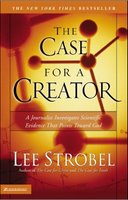 Introduction
IntroductionWas the universe created by an intelligent designer? In this book, Lee Strobel, a journalist, attempts to answer this question by interviewing various advocates of Intelligent Design (ID) theory, who argue that: (1) the universe, including life, was the product of an intelligent designer; (2) the naturalistic processes of evolution fail miserably to explain how life began; and (3) the designer of the universe is possibly the god of the Christian Bible.
I must admit that I enjoyed the book. Strobel provides an easy summary of theistic arguments for ID. His style is also easy to follow: he records his conversations with the experts in a dialogue format.
However, I’m afraid that I have more criticism than praise for the book. Although I have much to say, I will only offer three points of criticism.
Unbalanced presentation
I have copies of Strobel’s two earlier books: The Case for Faith and The Case for Christ. While reading these two books I was quite frustrated by the fact that Strobel only interviewed advocates from one side of the argument; only Christian apologists were considered. I was disappointed to see that The Case for a Creator is no different.
The false link between evolution, immorality and atheism
Strobel also spends an entire chapter arguing that belief in evolution was the cause of his atheistic world view and his atheistic world view was the cause of his immoral behaviour before he became a Christian.
This link is fallacious, simply because: (1) despite what creationists believe, and what some atheists might claim, the theory of evolution says nothing about the existence or non-existence of a god; (2) there are many Christians who believe in the theory of evolution and have no problem with it (in all fairness, Strobel does mention this fact); and (3) there are many atheists who are moral, considerate and who do not “pursue personal happiness and pleasure at all costs.” (pg 25)
Answering the unknown with the unknown
How exactly did this god create existence out of non-existence? What processes and methods did god use in order to create atoms? Where did god come from? ID theory remains vague and nebulous as it does not provide satisfactory answers to specific questions such as these. In other words, the postulation of a god to explain the mystery of the universe explains nothing as it only presents us with more unanswered questions (i.e., it only presents us with a bigger mystery). As an atheist, I’m content just to answer “I don’t know” to the question of existence.
Conclusion
I am fascinated by the ID hypothesis, and this is why I enjoyed Strobel’s book. Although Strobel did a good job in summarising the main arguments of ID theory, I feel that The Case for a Creator has a long way to go to build a solid case for an intelligent designer. For a much better critique of the book, visit this page.

5 comments:
"the theory of evolution says nothing about the existence or non-existence of a god;"
... what? Come again? How could you possibly come to such a conclusion?
Hi Francois
Thank you for popping by. When I finished writing a response to your comment I realized that it was quite long, so what I will do is publish my response as a separate post in the next few weeks. So watch this space . . .
All the best
Kevin
Kevin - looking forward to your next post on this. good thoughts - as always.
peace
I'm also looking at Case for a Creator, and hope to have a review of my own, as well as a thorough critiquing at some point in the near future.
Personally, I was always an athiest, though it had little to do with science.
Personally, I was really disappointed by the outright lies in the book. I also noticed the faulty atheism = immorality link. Is that really what these guys believe, or is it just a ploy to pander to borderline Christians that they are hoping to reassure?
How exactly did this god create existence out of non-existence?
I would propose that the very idea of existence itself is simply a construct in our minds to separate things that we know only 'exist' in our imagination from those things actually do 'exist' in the 'real' world.
The concept of existence only exists in our mind.
Bizarrely, that statement is self-fulfilling and valid :)
But I'm no expert or anything.
Post a Comment